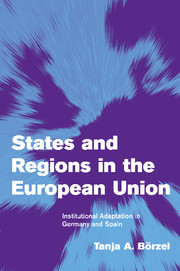Book contents
- Frontmatter
- Contents
- List of figures
- List of tables
- Acknowledgements
- List of abbreviations
- Introduction
- Part I Europeanization and domestic institutional change: A historical institutionalist approach
- 1 Europeanization as a process of institutionalization and institutional change
- 2 Conceptualizing the domestic impact of Europe: Resource dependency versus institutional adaptation
- 3 The domestic impact of Europe as an “institution-dependent” process
- Part II Reinforcing cooperative federalism: Institutional adaptation to Europeanization in Germany
- Part III Transforming competitive regionalism: Institutional adaptation to Europeanization in Spain
- Part IV Sharing versus shifting the costs of adaptation: The Europeanization of environmental policy-making in Germany and Spain
- Conclusions: Toward convergence in Europe?
- Appendix: The major EU environmental policies of the policy study
- List of references
- Index
2 - Conceptualizing the domestic impact of Europe: Resource dependency versus institutional adaptation
Published online by Cambridge University Press: 22 September 2009
- Frontmatter
- Contents
- List of figures
- List of tables
- Acknowledgements
- List of abbreviations
- Introduction
- Part I Europeanization and domestic institutional change: A historical institutionalist approach
- 1 Europeanization as a process of institutionalization and institutional change
- 2 Conceptualizing the domestic impact of Europe: Resource dependency versus institutional adaptation
- 3 The domestic impact of Europe as an “institution-dependent” process
- Part II Reinforcing cooperative federalism: Institutional adaptation to Europeanization in Germany
- Part III Transforming competitive regionalism: Institutional adaptation to Europeanization in Spain
- Part IV Sharing versus shifting the costs of adaptation: The Europeanization of environmental policy-making in Germany and Spain
- Conclusions: Toward convergence in Europe?
- Appendix: The major EU environmental policies of the policy study
- List of references
- Index
Summary
In order to conceptualize, describe, and explain the effect of Europeanization on the domestic institutions of the member states, most studies draw on two major strands of theory. They either embrace some sort of resource-dependency approach, which conceives of the European system of governance as a new political opportunity structure that changes the distribution of power resources among domestic actors. Or they resort to organizational theories of institutional change, which understand the domestic impact of Europe as a process of institutional adaptation in which domestic actors adopt and internalize new rules and practices. I argue that the two approaches are embedded in different forms of institutionalism and therefore vary in their expectations of whether, when, and how Europeanization effects the institutions of the member states.
The following two sections discuss resource dependency and institutional adaptation with respect to their capacity for explaining the domestic impact of Europe. Rather than embarking on an ideal-type metatheoretical discussion of different institutionalisms, I contrast the two approaches according to:
the major propositions which resource dependency and institutional adaptation pose on how actors behave, how institutions affect actors' behavior, and why institutions change;
the expectations which the two approaches generate about the conditions, the process, the degree, and the outcome of domestic institutional change caused by Europeanization.
The domestic impact of Europe as a resource-dependent process
Resource-dependency approaches are usually based on some sort of rational choice institutionalism as defined by James March and Johan Olsen (March and Olsen 1995: Chapter 2) and Peter Hall and Rosemary Taylor (Hall and Taylor 1996).
- Type
- Chapter
- Information
- States and Regions in the European UnionInstitutional Adaptation in Germany and Spain, pp. 18 - 26Publisher: Cambridge University PressPrint publication year: 2001



